8 Reasons “The Day of the Doctor” Made Me (Almost) Completely Forgive Steven Moffat
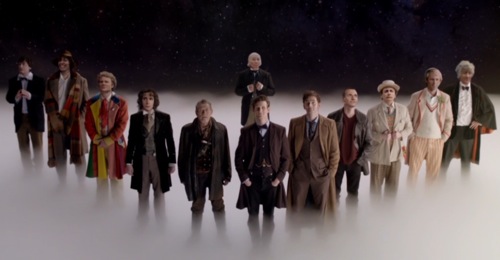 |
“The Day of the Doctor” debuted last Saturday at the same time all around the world, breaking the Guinness World Record for the largest global simulcast of a drama. But the big news for Doctor Who fans was how the show’s 50th-anniversary special changed much we thought we knew – just as writer/showrunner Steven Moffat promised it would. Also shown in 3D in movie theaters, the 75-minute episode featured an epic adventure in which Matt Smith’s Eleventh Doctor, David Tennant’s Tenth Doctor and John Hurt’s newly revealed War Doctor teamed up to face a devastating moment from the Doctor’s involvement in the legendary Last Great Time War – and pulled a move akin to J.J. Abrams’ reboot of Star Trek. One’s mileage may vary on whether the new Trek is any good; I have serious issues with it, but I do admire how writers Roberto Orci and Alex Kurtzman managed to simultaneously provide a clean slate while not erasing anything that came before.
And what Moffat did with “DotD” achieved a similar end for the Doctor, boldly rewriting a crucial point in the Time Lord’s timeline without taking away anything that’s already happened. That is one of Moffat’s true strengths: coming up with clever twists on what we think we know. And here, that twist alone was enough to make me almost forgive Moffat for every annoying thing he’s done since taking the reins from previous showrunner Russell T. Davies. Read on for more on that, and the seven other reasons that “The Day of the Doctor” has me giving the Moff a pass at last.
8. We Found Out Why Queen Elizabeth I Hated the Doctor
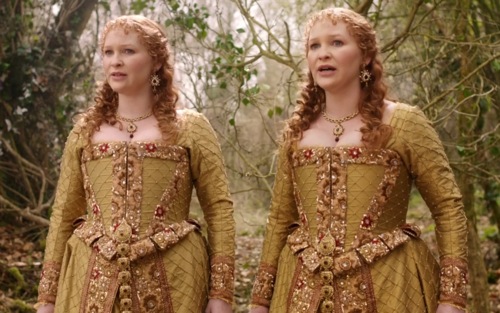 |
Back in 2007, at the end of “The Shakespeare Code,” the Tenth Doctor and new companion Martha Jones (Freema Agyeman) save the world from the invading Carrionites in 1599 – and cross paths with Queen Elizabeth I (Angela Pleasence). It’s a brief but unpleasant encounter with Her Majesty, who calls the Doctor her “sworn enemy” and commands her soldiers to remove his head. Ten and Martha beat it back to the TARDIS before that happens, but the Doctor has no idea why the Queen is so mad at him, saying he looked forward to finding out.
Later, in “The End of Time,” the Doctor tells Ood Sigma that he married “Good Queen Bess,” and that it was a mistake. When we meet Ten again in “The Day of the Doctor,” he’s galloping out of the TARDIS on a white horse in 1562 England, with a younger Queen Liz (Joanna Page) clinging to his waist. He proposes to her during an idyllic picnic…but it’s apparently a ruse, because when she accepts, he accuses her of being a shapeshifting Zygon. Unfortunately for him, the Zygon is actually the horse, although it does soon replicate the Queen. But eventually the real Liz I insists on carrying out the wedding. Afterward, as Ten is in the middle of his caper with Eleven and War, he hops in his TARDIS and says he’ll be right back. It seems he never returned – bringing on the enduring fury of a royal scorned.
7. We Got All the Doctors, After All
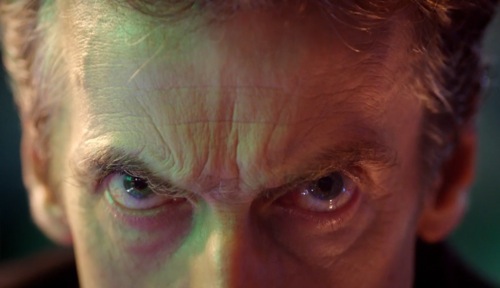 |
As expected, “Day” revolves around Eleven, Ten and War, but we did get to see all of the Doctor’s incarnations, woven in where the story called for it – including Christopher Eccleston’s Ninth and even Peter Capaldi’s Twelfth (angry eyebrows shown above), who wasn’t officially supposed to debut until the Christmas special. Granted, how all of his incarnations figured into a series of events that didn’t seem to have anything to do with Doctors One through Seven was one of the parts that didn’t make sense (see below), but oh well. I’ll forgive that because it was such a delight to see them all again.
The BBC has given us a lot of extra material in the form of short films such as “The Night of the Doctor” and “The Last Day,” and if you’re jonesing to see the classic Doctors in action (or at least the men who played them), check out the Peter Davison-directed comedy “The Five(ish) Doctors,” in which the erstwhile Fifth Doctor, along with Sixth Doctor Colin Baker and Seventh Doctor Sylvester McCoy, hilariously plot a way to crash the 50th-anniversary special. The 30-minute film also features Moffat himself, and it’s packed with delightful cameos from companions and other figures from the series’ history.
6. No Rose/Ten Reunion
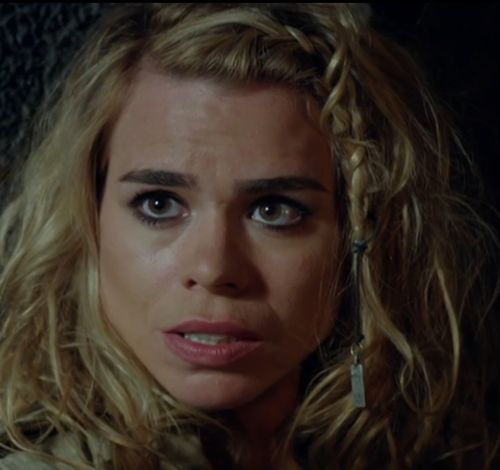 |
In a post-special interview, Moffat told journalists that he didn’t want to bring back Rose Tyler herself, because she belonged to RTD, her story was done and he didn’t want to add to it. “But we did want Billie,” he explained. “And I liked the idea of bringing back the Bad Wolf version.”
Me, too. Here the Bad Wolf version of Rose vaguely resembles the human incarnation of the TARDIS, Idris (Suranne Jones), seen in Neil Gaiman’s wonderful story “The Doctor’s Wife.” She’s got wild hair and raggedy clothing like Idris, but no one can see her, except for the War Doctor. That’s because Rose is the embodiment of the conscience of the sentient weapon called the Moment, the “galaxy eater” that the War Doctor has decided to unleash upon the Time War to end it, which will cause Gallifrey and the Daleks to burn up. In an echo of the TARDIS explaining that she doesn’t always take the Doctor where he wants to go, but always where he needs to, the Moment’s conscience pushes the Doctor to discover things about himself that he needs to come to the right decision.
A lot of shippers were bummed about the lack of Ten/Rose screentime, but frankly it was a relief to be spared yet another bout of that angst. Ten only realizes that the Bad Wolf was involved near the end of the adventure, when War gleefully exclaims, “Bad Wolf girl, I could kiss you!” But they’re about to do something really important, so there’s no time to even follow up on that little surprise. Well played, Moffat.
5. Lots of Easter Eggs
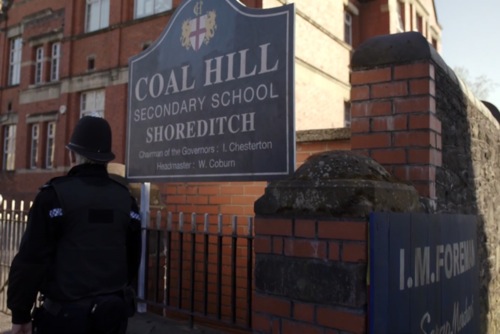 |
As obsessed as I am with Doctor Who, I don’t feel confident saying I spotted every single passing visual reference to the show’s long history, but I was delighted to see the ones I did recognize, such as how the opening moments perfectly echoed the opening of the very first episode, “An Unearthly Child,” taking us back to 76 Totter’s Lane, where we first see the TARDIS. And that current companion Clara Oswald (Jenna Coleman) has a new teaching job at the Coal Hill Secondary School, where the First Doctor’s granddaughter, Susan (Carole Ann Ford), met her teachers Ian Chesterton (William Russell) and Barbara Wright (Jacqueline Hill), who became the Doctor’s companions.
Not to mention River Song’s red high heels from “The Time of Angels,” the Space-Time Telegraph that the Fourth Doctor gave Brigadier Lethbridge-Stewart (and which Eleven uses here to contact the Brig’s daughter, Kate, now the head of scientific research for global alien defense organization UNIT), Captain Jack Harkness’s vortex manipulator (first seen in the Moffat-penned episode “The Empty Child”) and the Tenth Doctor’s last words (“I don’t want to go”) reuttered in a different, slightly more lighthearted context.
4. It Was Complicated…But Mostly Made Sense
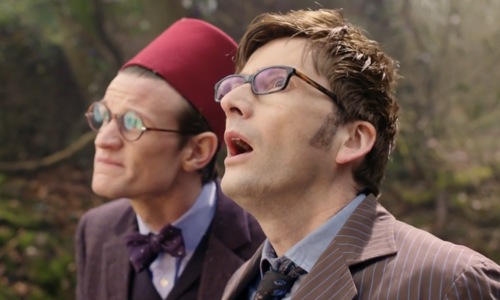 |
The story veered from the present day to 1562 England to not-sure-when in outer space, and ticked pretty much all the boxes on Moffat’s list of tricks and tropes. We got the mystery woman (or in this case “woman”) who shows the Doctor the way. A seemingly throwaway moment that turns out to be a crucial part of the plot (early on, one of Kate Stewart’s assistants gets a cellphone call, later revealed to be from Eleven, imparting important instructions). A formal invitation on paper, this time from Elizabeth I. An ordinary object that is not ordinary at all: a 3D painting depicting the Fall of Arcadia on Gallifrey that is actually a frozen slice of time itself. And creepy children…well, actually, this time the children weren’t creepy, but the thought of what was going to happen to them was.
In the past, Moffat has left so many loose ends hanging that it felt like he himself lost track of them all. (And have we ever found out exactly why the TARDIS exploded? I’ve, uh, lost track.) But this time his usual breakneck pace was somewhat slowed, and almost everything was neatly resolved. That doesn’t mean that fans aren’t going to argue the details for months to come, but for once I don’t feel like Moffat tried to wrap everything up with a string of rapidly delivered dialogue and a lot of literal hand-waving on the Eleventh Doctor’s part.
3. He Showed Us Something We’ve Always Wanted to See
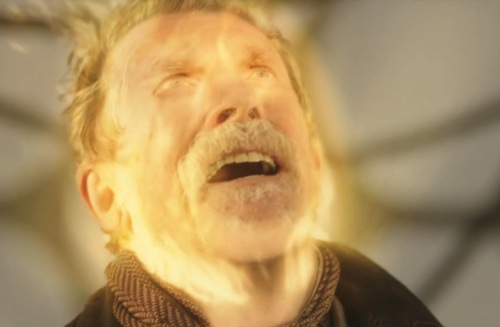 |
We learned from the Eighth Doctor short “The Night of the Doctor” that the War Doctor was born because the universe needed a warrior more than a doctor. So it seemed pretty clear that, as many fans suspected, Christopher Eccleston’s Ninth Doctor is the one who emerges from the Time War, somewhat scathed. Moffat gave us an explicit confirmation of that in “Day” when War, his work now done, steps into his TARDIS and begins to regenerate.
“I hope the ears are a bit less conspicuous this time,” War muses as the regen-ergy takes over. The transformation doesn’t show us Eccleston’s entire face, but all we really need to see is War’s eyes lighten up to that familiar Nine blue…and we know what’s coming. Too bad about the ears, though.
2. He Let Tom Baker Still Be The Doctor…Perhaps
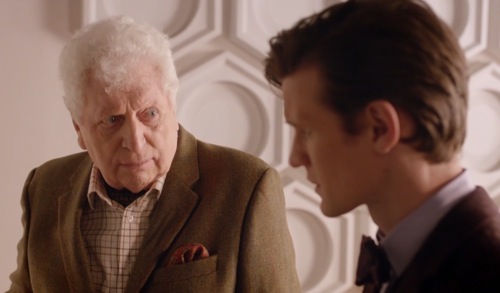 |
Four days before the special aired, Fourth Doctor actor Tom Baker mischievously revealed to the Huffington Post that he was indeed in the episode. “The BBC told me not to tell anybody,” he confided, “but I’m telling you straightaway.”
That was very exciting news, but I wondered how that could be? I figured Baker was having a little fun with the reporter, perhaps referring to old footage of his character that would be used. How wonderfully wrong I was! Instead, at the end of “Day,” as Eleven sits gazing at the Arcadia painting in the secret Undergallery below London’s National Gallery and musing that he could be the curator of this place one day, we hear a familiar voice say, “You know, I really think you might.”
And there he is: a white-haired Tom Baker, aka the Curator. Eleven recognizes him, and the Curator hints with a chuckle that perhaps he was Eleven…or perhaps Eleven is him. Baker gives us a little taste of Four’s many classic mannerisms, and also drops a detail the Doctor needs to know, which is that Gallifrey is indeed still out there somewhere. And that leads us to the last, best reason to forgive Steven Moffat…
1. He Fixed RTD’s Greatest Mistake
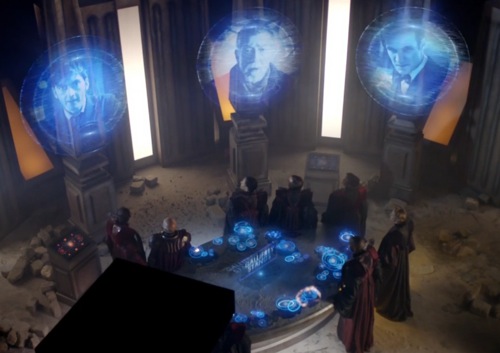 |
“Time can be rewritten” has been a recurring mantra for Moffat, usually followed by the caveat that this rule doesn’t apply to so-called “fixed points in time,” such as the death of Rose Tyler’s dad, the demise of companion Adric, the eruption of Mount Vesuvius, the fate of Bowie Base One on Mars, Jack Harkness’s existence and the Eleventh Doctor’s death at the hands of River Song on the shores of Lake Silencio.
Apparently, however, the biggest moment in the Doctor’s history was in fact not fixed. When Russell T. Davies revived the series in 2005, we learned that the Doctor’s people, the Time Lords of the planet Gallifrey, were all destroyed in the Last Great Time War with their archenemies, the Daleks. Now the Doctor was the last of the Time Lords and, worse, he himself had brought about their destruction, burning his home planet along with the Daleks because he had no other way to end a war that would consume all of reality. Cue the angst-ridden regret and core self-loathing that has become an undercurrent of the modern Doctor’s personality.
As much as I loved the rebooted show, I always hated that conceit. In the Classic Series, the Doctor never got on too well with the Time Lords. He didn’t like their policy of sitting around observing events and never getting involved. They didn’t like his insistence on trying to change things. He left Gallifrey in his stolen TARDIS, and whenever he got near it the Time Lords seemed to be putting him on trial, banishing him…or, on the occasions when they decided something did need to be done about a problem, using the “Renegade Time Lord” to maintain plausible deniability for their interference, as in the Fourth Doctor story “Genesis of the Daleks,” when they attempted to stop the Daleks from being created by trying to force the Doctor to thwart their creation on the planet Skaro.
Some people have complained that “The Day of the Doctor” has undone all of the key events of the Doctor’s life post-Time War (and along with them, all of that angst). But we’re specifically told that War and Ten (and, by extension, Nine) will not remember that they actually tried to save Gallifrey instead of destroying it – and will never know if they actually succeeded. Thanks to the Curator, Eleven does know that Gallifrey is out there somewhere, so I suppose Twelve will too. At the end of the special, the Doctor proclaims that he now knows where he’s going: home. I’m not sure how I feel about the possibility that the Doctor will now devote all of his time to finding Gallifrey, but I guess these days there always has to be a big arc.
That said, I think it’s fantastic that Moffat rewrote the Doctor’s story. By showing us the suffering of the people of Arcadia, especially how the children are helpless in the face of potential burning death, he’s underscored just how horrible RTD’s mistake was: a giant handwave that conveniently rid his Whoniverse of the Time Lords but was horribly, unforgivably cruel.
Now Moffat has opened the door to chucking out all that pain and agony, and I could not be happier. He’s given the Doctor back hope, and changed his view of himself to the one I prefer. I’ve always hated the whole “the Doctor brings death and destruction everywhere he goes” bit, because as we know, he only stumbles upon bad stuff that would have happened anyway. It sucks that he gets blamed for doing evil when he’s only trying to fix things, and it was even worse that he began to think there was some truth to that perception. RTD made a big mistake, and Moffat fixed it, and for that I’m willing to wipe the slate clean too. Bring on Series Eight!
More from Natalie Nichols:
10 Reasons to Both Anticipate and Fear “The Day of the Doctor”
Ten Reasons Peter Capaldi Is – and Isn’t – a Good Choice for Doctor Who
Nine Things From Doctor Who Series 7 (Part Two) That We Stil Need to Talk About

